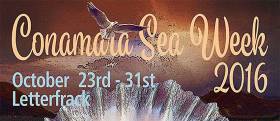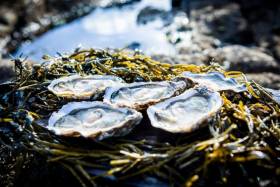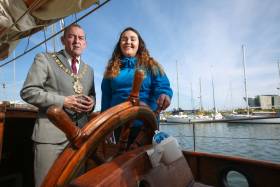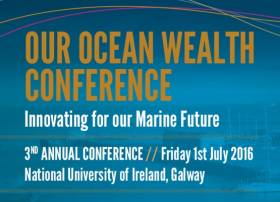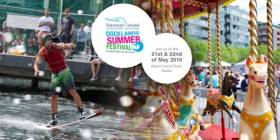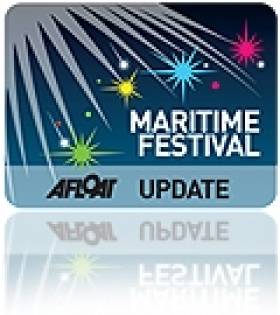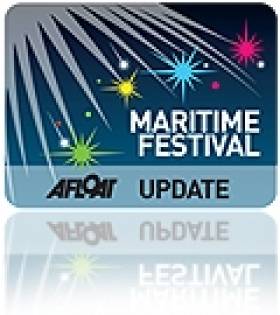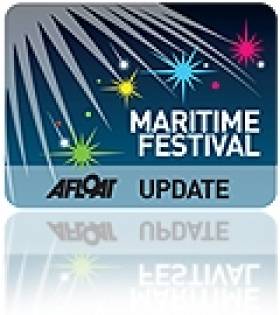Displaying items by tag: Maritime Festivals
Mini Regatta Kicks Off Conamara Sea Week
#ConamaraSeaWeek - The 32nd Conamara Sea Week got under way in Letterfrack yesterday (Sunday 23 October) with a full programme of entertaining and educational events, including a mini sailing regatta.
The Connacht Tribune has much more on the maritime festival line-up for the week ahead, centred this year around a schools programme bringing together marine ecologists and storytellers to involve children and young people in Connemara in all aspects of the sea.
Carlingford Oyster Festival Opens Today
#MaritimeFestivals - The 2016 Carlingford Oyster Festival kicks off this evening (Thursday 4 August) on the shores of Carlingford Lough with the official opening of the event that runs till Monday 8 August.
This Saturday (6 August) is when the festivities really under way, with local restaurants offering samples of their finest seafood dishes.
Visitors will have an opportunity to try some of the Co Louth town's renowned local oysters at the Festival Oyster Tent.
There will also be guided tours of what's one of Ireland's few remaining Medieval walled towns, to coincide with Irish Walled Towns Day on Sunday 7 August.
#TitanicMaritime - Belfast City welcomes some of the Tall Ships back for the Titanic Maritime Festival a three day event (28-30 May) that begins today and includes this Spring Holiday Monday in the UK.
Groups of young people from across the city have been enjoying the challenge of life on the ocean waves, thanks to Belfast City Council’s Sail Training Initiative.
A total of 30 volunteers, aged between 16 and 28 and from all parts of the city, are taking part in series of voyages on board the tall ships Maybe and Morgenster. They were scheduled to call to ports such as Dublin, Liverpool, the Isle of Man, Derry/Londonderry, Galway, Cork, Oban, Carsaig on the Isle of Mull and Lamlash on the Isle of Arran.
Lord Mayor, Councillor Arder Carson, said: “These voyages will provide the participants with a unique, challenging and inspirational experience that increases their self-awareness and self-confidence, develops their teamwork and leadership skills and creates a strong sense of community responsibility, perhaps helping them to become future civic leaders.
The Lord Mayor added “As members of trainee crews, along with trainees from Dublin, Galway and Liverpool they will be an important members of the crew and their participation in all activities is essential to the smooth running of the voyage.”
During the voyages, the trainees will help in all aspects of life on board, including trimming sails, steering and navigation.
The Belfast Titanic Maritime Festival and for further details, click here.
Our Ocean Wealth Conference 2016 - Registration Now Open
#OurOceanWealth - Registration is now open for the 2016 Our Ocean Wealth Conference at NUI Galway on Friday 1 July.
As previously reported on Afloat.ie, this year's conference will again take place alongside SeaFest, Ireland's national maritime festival, hosted this year in Galway Harbour from 2-3 July.
The full conference agenda is yet to be announced but items of focus will include:
- Progress on the implementation of Harnessing Our Ocean Wealth - Ireland's Integrated Marine Plan
- Into the Blue: Economy and Growth
- Map, Observe, Predict: Innovating Across the Atlantic
- Our New Relationship With the Sea
For more information or to register for the conference visit www.ouroceanwealth.ie.
Waterways Ireland Docklands Summer Festival This Weekend
#InlandWaters - The Waterways Ireland Docklands Summer Festival takes place this weekend 21-22 May with a wide array of activities for all.
Water-based experiences include kayaking, paddle boarding and barge rides, as well as the opportunity for the young and old to try their hand at a range of interesting water sports.
If you'd prefer to stay dry, events for land-lubbers include water golf off the jetty or the rubber duck race.
The festival promises a hive of activity across the Docklands, with entertainment and family fun guaranteed. Find out more HERE.
This Saturday 21 May also sees the Waterways Ireland Loughfest take place at the Fermanagh Lakeland Forum in Enniskillen.
The annual extravaganza, organised by Fermanagh and Omagh District Council, promises to be a fun-packed day for all the family, with a range of events taking place on Lough Erne and the Broadmeadow from 12 noon till 4pm. Details are HERE.
Harnessing Our Ocean Wealth Conference 2016 - Save The Date
#OurOceanWealth - NUI Galway will host the third annual Our Ocean Wealth Conference on Friday 1 July.
The previous two conferences – in the inaugural event in Dublin Castle and last summer's in Cork Harbour – have outlined the progress in implementing the Government's 2012 Harnessing Our Ocean Wealth: An Integrated Marine Plan for Ireland.
And like last year's event in Ringaskiddy and Haulbowline, this year's conference will precede the return of SeaFest, Ireland's national maritime festival, in Galway Harbour from 2-3 July.
Further details are available at the Our Ocean Wealth website HERE.
Another upcoming date for the diary is the 26th Irish Environmental Research Colloquium.
'Ecosystem Services for a Sustainable Future' is the title of Environ 2016 at the University of Limerick from Tuesday 22 to Thursday 24 March.
For more information contact Sinead Macken at 086 807 1498 or [email protected] or visit www.environ2016.org
Dublin Bay Prawn Festival Moves To March For St Patrick's Celebrations
#MaritimeFestivals - This year's Dublin Bay Prawn Festival is moving a month earlier to tie in with the St Patrick's festivities in Ireland's capital.
As ever, your favourite prawn dishes will be the star of the show at the food village in the heart of Howth from Friday 18 to Sunday 20 March.
The full programme of events is yet to be announced, but the three days of food and fun are set to kick off once again with the 'mystery dine-around' on Friday 18 March, with a wine reception and courses from some of Howth's finest seafood restaurants. (Tickets priced at €65 per head are going fast.)
In addition, this year's festival will feature an evening of music and dance celebrating Irish, Slovakian and Brazilian culture.
For more details are they are announced, visit the Dublin Bay Prawn Festival website HERE.
Lough Erne Food Festival This Weekend
#MaritimeFestivals - The inaugural Festival Lough Erne is taking place in the island town of Enniskillen, Co Fermanagh this weekend – a celebration of food and the waterways with fun for all ages.
In the tented village there will be opportunities to meet local food producers and sample the very best of the area's produce, see guest chefs at work and pick up some informative cookery tips and recipes, all whilst tickling the taste buds.
Find out more about the festival's happenings today (Saturday 20 June) and tomorrow at the Fermanagh Lakelands website HERE.
#SeaFest - Marking World Oceans Day across the globe today (Monday 8 June), Marine Minister Simon Coveney announced the first national celebration of Ireland's oceans next month.
The inaugural national maritime festival SeaFest will take place in Cork Harbour on 10 and 11 July and will see thousands of visitors enjoying the fruits and pleasures of the sea, from boating trips, yacht sailing, open water swimming, marine simulators, rescue demonstrations, sea life exhibits, educational screenings and talks, festival family fun and a food village with live seafood cookery demonstrations with some of Ireland's best known chefs.
"As an island nation, it is so important to recognise and celebrate the incredible resources of Ireland's abundant and surrounding seas," said Minister Coveney at today's SeaFest launch. "This two-day festival will travel Ireland, taking place in Cork in 2015 and with plans already underway to bring SeaFest to Galway in 2016.
"It is a national festival at which we can share our seafaring heritage and future, enjoy a myriad of water sports and activities, have fun while learning about the sea and the opportunities it presents, and feast on some of the world's best seafood. I am hugely excited about this national festival, SeaFest, and look forward to it becoming one of Ireland's leading festivals in the coming years."
Cookery demonstrations, workshops on how to cook and eat prawns, lobsters, mussels and oysters among other seafood will be hosted by the seafood development agency, Bord Iascaigh Mhara (BIM) and Bord Bia, the Irish Food Board, with renowned seafood chefs Martin Shanahan and Rory O'Connell.
As well as leading Irish chefs showing people just how easy, quick and healthy it is to enjoy fresh fish from our oceans, there will also be fishmonger demonstrations, seafood sampling, rope making, talks on seafood and a large fish market at the festival.
The Harnessing Our Ocean Wealth Conference, which forms a key part of SeaFest, will attract international and national delegates and experts in marine research, ocean energy and the 'blue economy' to Cork.
"Ireland is one of the largest states in the EU if you take into account our seabed area," said Dr Peter Heffernan, CEO of the Marine Institute. "With our exclusive rights to a sea area more than ten times our land size, Ireland's ocean is a national asset providing incredible opportunities for tourism, energy, food and new applications for therapeutics and technology. SeaFest aims to celebrate and acknowledge the importance of the sea for the island."
The National Maritime College of Ireland (NMCI) will be sharing their facilities, normally used to train for a career as a maritime professional, with the public at SeaFest.
Festival goers can experience various ship models in national and international waters in a variety of weather conditions via the simulators; these simulation exercises show the skills required when working at sea.
Also open for visitors will be UCC's new Beaufort Building. This state-of-the-art €15 million facility will house the LIR National Ocean Test Facility and the SFI MaREI centre, which is a cluster of key university and industrial partners dedicated to solving the main scientific, technical, social and economic challenges related to marine renewable energy.
The Irish Naval Service will be on hand to provide tours of the offshore patrol vessel LE James Joyce, the sister ship to LE Samuel Beckett.
Members of the Irish Defence Forces will tell visitors about the activities of the Irish Navy, situations encountered aboard while at sea and showcase the latest in modern seafaring technology on board this new ship.
The Marine Institute research vessel RV Celtic Voyager will be visiting SeaFest before departing on a survey to investigate algal blooms off Ireland's coast.
The RNLI are the nominated charity for the SeaFest event and 2,000 ducks in lifeboats will take part in a duck race in Cork Harbour to raise funds for the charity, which provides rescue services all around the Irish coast and saves hundreds of lives at sea each year.
There will also be a parade of sail including superyachts, racing yachts, private leisure craft and boats that will sail from the mouth of Cork Harbour to the Port of Cork Marina in the city centre.
The parade of sail will follow the open water swimmers of the Lee Swim, which is taking place on 11 July and will see hundreds taking to the sea to enjoy a refreshing and strenuous in the sea.
SeaFest 2015 promises to be a thoroughly enjoyable festival for all. Don't miss this opportunity to enjoy the best of Ireland's oceans this July in Cork Harbour.
A full schedule of festival fun has been announced at www.seafest.ie.
#Riverfest - The Dublin Bay Old Gaffers Association has timed its annual regatta to take place this weekend during the third Dublin Port Riverfest.
Weather permitting, the DBOGA will race in Dublin Bay for the Leinster Plate Trophy on Saturday 30 May, while on Sunday 31 May they will sail upriver to berth along the north quays and enjoy the festival's atmosphere before parading back to the Poolbeg Boat and Yacht Club.
Then on Bank Holiday Monday 1 June they will join an even bigger parade of sail to salute the departing tall ships – including the square rigger Kaskelot.
More details on the Old Gaffers' weekend plans – and how you can join in the fun – are available HERE.
And don't forget this summer's cruise in company along the 'Fastnet coast' in West Cork.


























